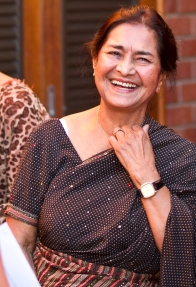
The University of the Witwatersrand, Johannesburg, extends its deepest condolences to the friends, family and comrades of the late Amina Cachalia, a lifelong activist who dedicated her life to fighting for freedom in South Africa.
We acknowledge the passing of Amina with great sadness, for in her we have lost not only a freedom fighter, but more importantly, a human rights activist and a protector of the vulnerable.
Amina, and indeed her family, are close friends of Wits. In recognition of her achievements, the University bestowed its highest honour, an Honorary Doctorate of Laws, on her in 2004, the same year in which the National Order of Luthuli (Bronze) was bestowed on her by the South African government. A brief synopsis of her life follows below, reflecting something of the tremendous contribution of this great stalwart of our society.
Prof. Rob Moore
Acting Vice-Chancellor and Principal
Wits University
Biography:
Amina Cachalia (nee Asvat) was born on 28 June 1930 in Vereeniging, the youngest daughter of Ebrahim and Fatima Asvat. The family’s tradition of political activism dates back to her father’s close association with Mahatma Gandhi and the first passive resistance campaign of 1907. Amina’s subsequent political activism and championing of women’s rights was almost preordained.
Amina ensured she was sent to school in Durban in the mid-1940s because she was aware (partly through the role played by her sister) that the women’s passive resistance campaign would be launched from that city and she wanted to be part of it. The organising committee, however, decided she was too young, slight and frail to go to jail, and, much to her chagrin, she was prevented from participating actively at that stage.
She returned to Johannesburg towards the end of 1947 when the campaign drew to a close, and, because of the parlous state of the family finances, she took up a number of jobs, eventually settling into permanent employment as a secretary in a garment factory. Her experience as a woman in the workplace underlined for her the importance of financial independence and the need to amass skills, and she founded the Women’s Progressive Union (WPU) to foster training, skills development and the financial independence of women. The response to the WPU was enthusiastic and the union grew and flourished for four years under Amina’s mentorship, until she went to jail in 1952 during the Defiance Campaign.
In the 1950s, she was an active member of the Peace Council and was politically active in the Indian Youth Congress, of which she was an executive member; the Indian Congress; and the Federation of South African Women (Fedsaw), of which she was the national treasurer. She was involved in organising the protest campaign against passes for women and was one of the leaders of the 20 000-strong march of women on the Union Buildings, in Pretoria, in August 1956.
As part of her ongoing political activism, she helped organise the Congress of the People in 1955 and attended as a delegate. During the Treason Trial, she was involved in looking after the dependants of the trialists. As the political struggle against apartheid gained momentum in the late 1950s, Amina Cachalia’s active leadership role in Fedsaw and the Youth Congress, as well as her participation in the structures of the Transvaal Indian Congress, brought her into close contact and co-operation with the Congress of Democrats, the Coloured People’s Organisation, and the African National Congress.
Her political activism and her involvement in the organisation of protests and campaigns continued until the government’s crackdown on organisations in 1960. Thereafter, Amina pursued her political activities clandestinely and, as a result, was served with a restrictive banning order in 1963 while she was recuperating from a serious heart operation. During that year, she played a key role in planning and executing the escape of Arthur Goldreich, Harold Wolpe, Mosie Moolla and Abdulhai Jassat from the prison in Marshall Square.
Her underground activities continued throughout the period of her banning, which lasted from 1963 to 1980. Her late husband, Yusuf, too, was banned, and for 10 years was under house arrest. In the 1980s, Amina Cachalia served as a patron of the Federation of Transvaal Women (Fedtraw) and was active in organising women in the liberation struggle. During this period, she participated in bodies, including the United Democratic Front, which were actively opposed to the Tricameral Parliament.
When the ANC Women’s League was resuscitated in the 1990s, she served on the committee of the PWV region. She was elected a Member of Parliament for the National Assembly in the first democratic elections and was offered an ambassadorial posting, but was unable to accept because of family commitments.
Amina served in organisations and groups that focused on the upliftment of women, the nurturing and protection of children, and the rehabilitation of the disadvantaged. She was a trustee of the Nelson Mandela Children’s Fund, Ububele (a psychotherapeutic rehabilitation centre in Alexandra), and Operation Hunger. She served on the Finance Committee of the National Women’s League and several other projects in recent years.
Issued by: Wits University
Photo by: Judith Doubell
